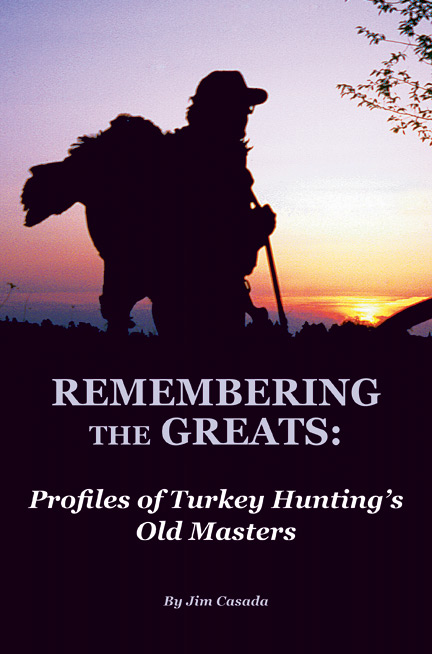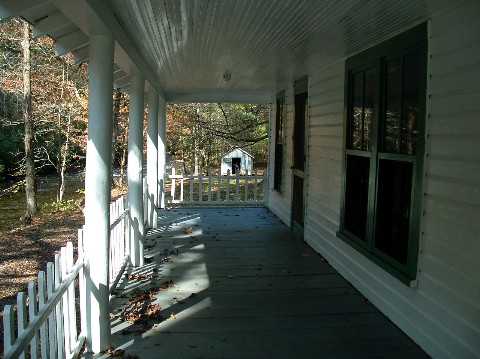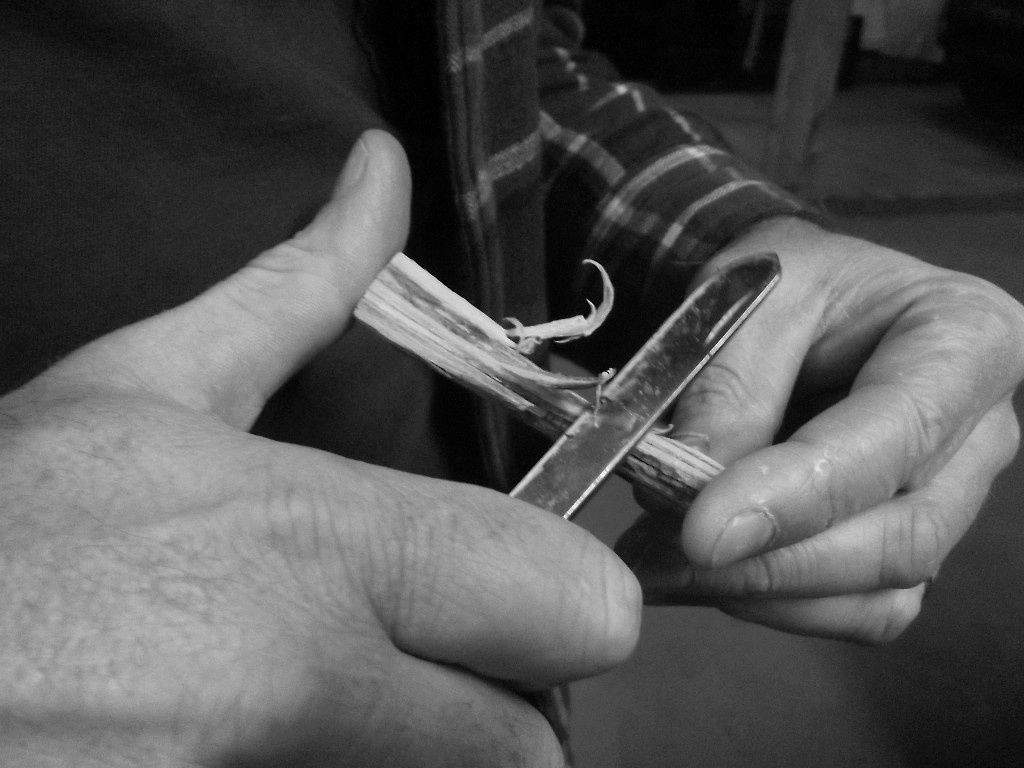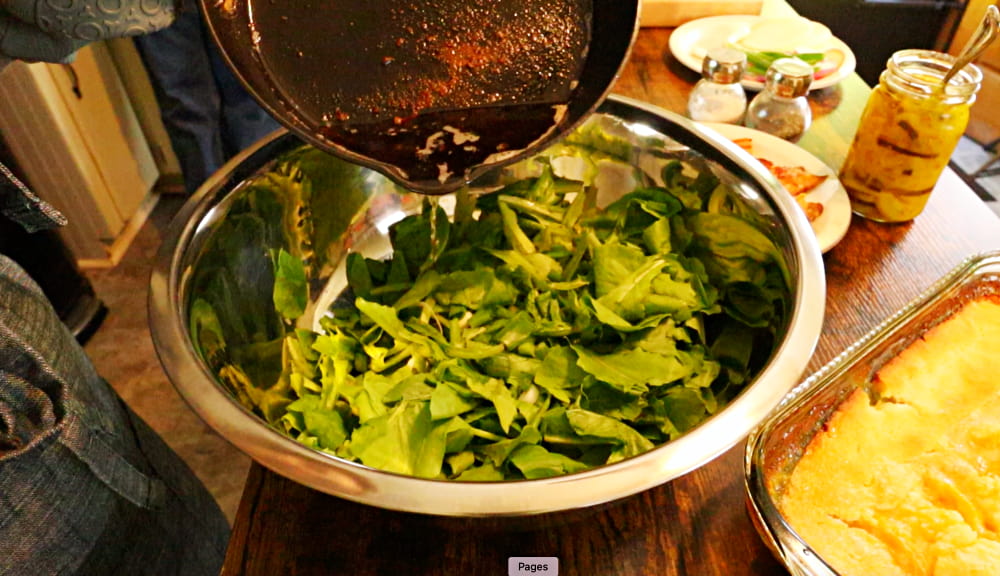FATHER’S DAY SPECIAL

With another turkey season behind those hapless souls, such as yours truly, who are addicted to the quest for the grand bird, it’s time for a return to normality and perhaps some reading about the sport. With such thoughts in mind I’m offering a special price for a book honoring the sport’s pioneers, Remembering the Greats: Profiles of Turkey Hunting’s Old Masters. The book garnered a couple of awards when it was published, and just a week ago a modern-day turkey maestro, Mark Drury, called me, ordered a bunch of copies to give to turkey-hunting friends, and said: “Jim, that’s a wonderful book.”
I’ll readily admit I’m proud of the effort as well as the physical appearance of the book. It runs to well over 300 pages, is in hardcover form, includes dozens of vintage photographs, has a lovely photo on the front of the dust jacket, and profiles twenty-seven true icons of the sport. The book would make a great Father’s Day gift or maybe just an addition to your library or that of a sporting friend. For the rest of May and all of June, the book is available at almost half price, $20, and on top of that I’ll pay the shipping. Send payment by check or money order to: Jim Casada, 1250 Yorkdale Drive, Rock Hill, SC 29730.
I would also note that you’ve got roughly two weeks left to buy my forthcoming book, Fishing for Chickens: A Smokies Food Memoir, for $28.95 with me paying the shipping. The book is due out in the middle of June and as is always the case with book authors, I wait with a strong sense of anticipation.
*************************************************************************************
MAY’S MAGIC, SOME MUSINGS ON A MISERABLE SITUATION, AND FOND MEMORIES
As a lad, I was constantly in trouble in school because of a pronounced tendency for my mind to wander. A series of grade school teachers struggled, with varying degrees of success, to keep me busy and occupied in a fashion that, at least, wasn’t disruptive to my classmates. These days no small measure of that penchant for what might be called day dreaming but probably more accurately could be reckoned a singularly disorganized way of thinking involves looking back. More often than not, that hankering for the past involves a belief that in many ways “progress” has been anything but a boon. In my view, at any rate, the simpler days and simpler ways of yesteryear were a delight, a blessing, a benefit, and truly special.
Although I didn’t ponder such matters as a boy, I’m pretty confident that the world I grew up in during the middle of the last century was not as troubled or fractured as is the case today. Sure, folks disagreed, sometimes virulently, but seldom indeed were those differences, whether political, religious, philosophical, or what have you, so pronounced as to remove so much as a modicum of mutual respect. And certainly one thing existed that has since blown away like dandelion spores caught up in a late afternoon dust devil; namely, a willingness to work. Folks back then would accept a hand up if absolutely necessary, but they were far too proud, far too independent, to seek a hand out. Today, thanks to the welfare state, we are now into the third generation of a sizeable portion of society that really doesn’t know what regular work or a job means. They procreate, rely on “the government” for basic necessities, and all too frequently use idleness to get into serious trouble connected with crimes.
I don’t pretend to have answers, but I believe Lyndon Johnson, with the advent of the so-called “welfare society,” created a monster that threatens to consume us. Every time I stand in a grocery store checkout line while an unwed mother pays with SNAP cards (that probably isn’t the precise term, but whatever you call what was once termed food stamps), whenever I drive through a neighborhood on the way to my local post office and see a couple dozen males in their twenties and thirties lounging on porches with beers in hand during the middle of the day, or when I read of the latest street shooting, I’m dismayed. We are a runaway nation already off the tracks, and it’s not a Republican or Democratic matter. I genuinely feel that most national-level politicians are corrupt or misguided—or both.
That’s enough in the way of a diatribe, but it seems that whenever I begin to think about the blessings and bliss I have been privileged to know, such matters come to mind. Incidentally, if you feel I’m way off base here or have become too inclined to pessimism, don’t hesitate to contact me and set me straight. Goodness knows I’m wrong with considerable regularity, and while differing with me may not change my mind, just as agreeing with me won’t make me absolutely certain I’ve got a stranglehold on the truth, it will give me pause to ponder (and I love hearing from readers).

Commodore and Anna Lou Casada
Thankfully I had loving, hard-working parents who cared for and about their offspring with a degree of intensity that was the focus of their lives. Likewise, I’ve been blessed, in my own small family, to have loved ones who knew and deeply appreciated the curative and creative powers of a staunch work ethic. My late wife had an inner stubbornness, a deeply rooted “I’ll get it done” outlook. That meant she would tackle almost anything and, with rare exceptions, get it done. Of course there was a time when she decided to turn her hand to being an electrician that had sparks a-flying and the smell of a blown transformer in the air, but at the heart of her being she was someone who tackled each new day with a will and determination of the sort not found often enough in today’s world.
Similarly, our daughter, from school days to the present, has been hard-working and something of an overachiever of the sort to make any father proud. And her daughter, in turn, a rising college senior, demonstrates the same traits, if anything to a greater degree. How she balances being an athlete, a stellar student, holding multiple offices in various college groups, and more constantly amazes me. I can get tired just thinking about all she has on her plate. Still, pride in immediate family notwithstanding, I worry about the “family” that is our nation and its future. When I find myself getting bogged too deeply in that depressing arena though, I have a nurturing nostrum to lift my spirits—I go back to the past and resurrect things that I once did, observed, or knew as common parts of everyday life. Doing so is amazingly uplifting, and with all that “philosophising” (my Grandpa Joe’s terminology for such bouts of thinking) let’s turn to something I hope you will find enjoyable and maybe even a bit of a tonic.
Not infrequently my mind, which still wanders at least as much as it did when I was a boy, finds me asking myself questions along the general line of: “Where have once commonplace things gone?” The answer, in most cases, is that they’ve yielded and vanished before that aforementioned false god we know as progress. Still, it’s a joy to look at some of these vanished or vanishing aspects of the world as I once knew, as I suspect was equally true for many of you. In some cases there’s no particular link to May, or at least not much more than some other month, but there will likely be some things here you recognize (and miss) just like me.
*A car or truck trundling down a country road with the front passenger side window at least partly open with a whole bunch of fully rigged cane poles sticking out of it. That was a sure sign some folks—maybe a family, a couple of boys, or an old man about to become a boy again for a few hours as he mixed with and mentored grandchildren—were heading out for a day’s fishing.
*Kids anxiously and impatiently awaiting the arrival of weather sufficiently warm to allow them to go barefooted whenever they pleased. Or, for that matter, just seeing barefooted kids frolicking outdoors.
*Vehicles with the radio antenna sporting a ‘coon’s tail or one from a red fox as decoration. Of course it isn’t just the decoration that’s gone. So are the antennas. Sure is a distant remove from Sirius and so many blooming channels as to be mind blowing.

*Folks sitting on the back porch (or depending on the architecture of the house, maybe a front porch) of an evening in the summer. They’d likely be stringing and breaking beans, shelling peas, or working up fruit. Or perhaps they’d be digging into dripping slices of a watermelon that had spent the last few hours in a wash tub surround by ice water or enjoying the fruits of labor involved in producing a run of hand-cranked ice cream. Whatever the case, it was an opportunity to relax, look back on the day, or contemplate what lay ahead on the morrow.
*Kids chasing lightning bugs in the darkness.
*Youngsters with a June bug tied to a piece of sewing thread to produce a drone that cost nothing to acquire or operate.
*Old timers playing checkers or telling lies on a town square.
*Spotting a “See Rock City” sign painted on a two-story barn or bird house condominiums carrying the same message.
*Digging your own worms or seining your own minnows for fishing bait.
*Making cane pole rigs of the sort mentioned at the outset of this list using poles you had cut, hung, and cured; bobbers shaped from a cork bottle stopper; sinkers made from the lead covering on roofing nails; line bought in a spool that offered the “makings” for a couple dozen rigs; and hooks, whether snelled or loose, that could be purchased individually in the same way you could buy shotgun shells.
*Witnessed a street preacher or “Bible thumper” in action (although some of the TV mega-church leaders seem to me pretty much the same thing writ large and with a yen for lots of money from a flock all too ready to be fleeced).
*Observed local farmers peddling produce from the back of a pick-up truck at some pull-off as opposed to in a “locally grown market” or “farmers’ market.”
*Seen a starry-eyed boy oiling his baseball glove and pounding a ball into end time without number to make a good “pocket.”
*Watched an old man whittle with a perfectly sharpened pocket knife that produced curls of wood that seemed almost as much works of art as the object he was carving.

Shaving lightered wood to start fire
*Been with someone in the woods who never, ever passed by a good piece of “lighter wood.”
*Eaten a tasty “kilt” salad from your own garden.
*Seen small girls joyfully playing hopscotch on a sidewalk suitably marked with chalk.
*Heard of, witnessed, or participated in a session of skinny dipping. In today’s world of home pools, municipal pools, and the like, visits to the old swimming hole, whether clothed or not, seem increasingly rare.
*Attended an old-time revival where grand Gospel songs filled the air with joyous sound.
For me, at least, most of these things have become either rare or non-existent, but by the same token I know I’m blessed by having been able to sample and savor them in my younger years.
************************************************************************************
JIM’S DOIN’S
I’ve had less material appear in print over the past month than is sometimes the case. The current issue of Sporting Classics (I haven’t seen it yet but know it has arrived in some subscribers’ mail boxes) has my regular book column along with a ruminative feature story of mine titled “Third Century.” That title comes from the use of the word century, meaning a hundred, as a means of counting such as the British do when tallying runs scored in cricket. When a batsman “hits for a century” he has accomplished a rare and noteworthy feat. This story describes my lifelong quest for turkeys and how I reached the “third century” mark (have killed 300 turkeys) and some special moments along the way. I would note that in my own view, albeit one that never means much when it comes to a writer judging his own work, it’s about as good as I’m capable of offering. My latest contribution to Carolina Mountain Life, where I write a “Musings and Memories” piece for each issue, is “Weather Folklore of a Mountain Springtime,” Spring, 2022, pp. 85-86.
Beyond that, much of my energy has centered on the Southern Appalachia cookbook I’m writing in tandem with Tipper Pressley. Almost predictably, she’s ahead of me in terms of getting things done, but both of us have selected big batches of recipes and we are now busy coordinating them, working on obtaining photos to support the effort, and cobbling together the narrative portion. You’ll be hearing a lot more about this joint effort in coming issues of this newsletter. Meanwhile, let’s wrap up by turning to the subject matter of the book, Appalachian foodstuffs, with a few recipes.
**********************************************************************************
RECIPES
My Mom used to say that May marked the official opening of “Barefoot Season.” By that she meant it was all right to go unshod as we pleased and without admonitions such as “You’ll catch your death of a cold.” Nowadays the month also brings on grilling and outdoor cooking season. Here’s a fine way to prepare some of that venison from the past fall’s hunts (or if you aren’t so fortunate, beef will work just fine).
VENISON KABOBS
2 to 3 pounds of venison loin
Make a marinade of ½ cup soy sauce, ½ packed cup brown sugar, and ½ cup olive oil. Mix the marinade ingredients together and heat over medium heat, constantly stirring, until the sugar dissolves. Set aside to cool. Place venison chunks, cut into one-inch pieces, in a nonmetallic bowl and pour marinade over them. Refrigerate for 4 to 6 hours. When ready to cook, prepare grill for direct medium heat and lightly oil the grate. Thread venison pieces, along with other ingredients such as button mushrooms, cherry tomatoes, pineapple chunks, wedges of onion, bell pepper slices, or partly pre-cooked potato pieces on skewers. Place skewers on grate and cook for 20 to 30 minutes or until venison reaches desire doneness. Turn several times while cooking.
GARDEN OMELET
Come spring’s greening-up time, some ancient switch of procreation is triggered not only in chickens but most birds. Laying hens are at their most productive in this season, and that translates to eggs aplenty for anyone raising chickens. Eggs are also one of the less expensive protein sources in grocery stores, and a super-abundance of eggs is a pleasure, not a problem. Eggs are sometimes described as the perfect food, and a grand way to enjoy them, simple as it scrumptious, is in a two- or three-egg omelet incorporating whatever is available in the way of vegetables from my garden or that of nature.
Vegetable choices might involve asparagus, spring onions, ramps, spinach, Swiss chard, morel mushrooms, water cress, or other items. Add salt and pepper to taste, some sharp cheese, a bit of butter, or maybe crumble in a couple of slices of bacon or streaked meat fried to a crisp and you have some mighty fine eating. Omelet pans are great, but you can make an omelet in a large frying pan. Just empty the beaten eggs and other ingredients into a large, well-greased skillet, and once the bottom is firmly cooked, flip half over to make a half-moon shape and complete cooking. HINT: Adding a tablespoon or so of warm water to the mix when you beat the eggs up produces a fluffier end product.
CHICKEN AND EGG SALAD
This is a fine way to utilize left-over stewed or bake chicken and/or a surplus of eggs. It’s good whether eaten atop a lettuce base, with soda crackers, or in a sandwich.
2 cups chopped chicken (or use blender to pulse it to a coarse but not overly minced state)
4 large eggs, boiled, peeled, and coarsely chopped
¼ cup chopped sweet pickles
Salt and black pepper to taste
2-3 tablespoons of mayonnaise (more if needed for right consistency)
1-2 tablespoons of prepared mustard (amount will depend on how much you like mustard’s tang)
Prepare the chicken, eggs, and pickles then place together in a large mixing bowl. Add the mayonnaise, mustard, salt, and pepper. Stir thoroughly with a large wooden spoon. Refrigerate until ready to eat.
“KILT” SALAD
 A traditional and much beloved seasonal dish in the Smokies where I grew up, and indeed throughout much of Appalachia, was a salad featuring fresh leaf lettuce from the garden or maybe branch lettuce (saxifrage) from the wilds. Rest assured it will be a recipe appearing in the cookbook Tipper Pressley and I are doing, and she recently featured the dish in one of her “Celebrating Appalachia” video blogs. The lettuce would be combined with chopped spring onions or maybe ramps from nature’s bounty, perhaps sprinkled with crumbled bacon bits or fried streaked meat, then dressed with the hot grease from frying bacon or streaked meat. The hot grease wilted or “kilt” the lettuce. It’s wonderful eating, especially with some radishes and a chunk of cornbread to go with this delicacy.
A traditional and much beloved seasonal dish in the Smokies where I grew up, and indeed throughout much of Appalachia, was a salad featuring fresh leaf lettuce from the garden or maybe branch lettuce (saxifrage) from the wilds. Rest assured it will be a recipe appearing in the cookbook Tipper Pressley and I are doing, and she recently featured the dish in one of her “Celebrating Appalachia” video blogs. The lettuce would be combined with chopped spring onions or maybe ramps from nature’s bounty, perhaps sprinkled with crumbled bacon bits or fried streaked meat, then dressed with the hot grease from frying bacon or streaked meat. The hot grease wilted or “kilt” the lettuce. It’s wonderful eating, especially with some radishes and a chunk of cornbread to go with this delicacy.